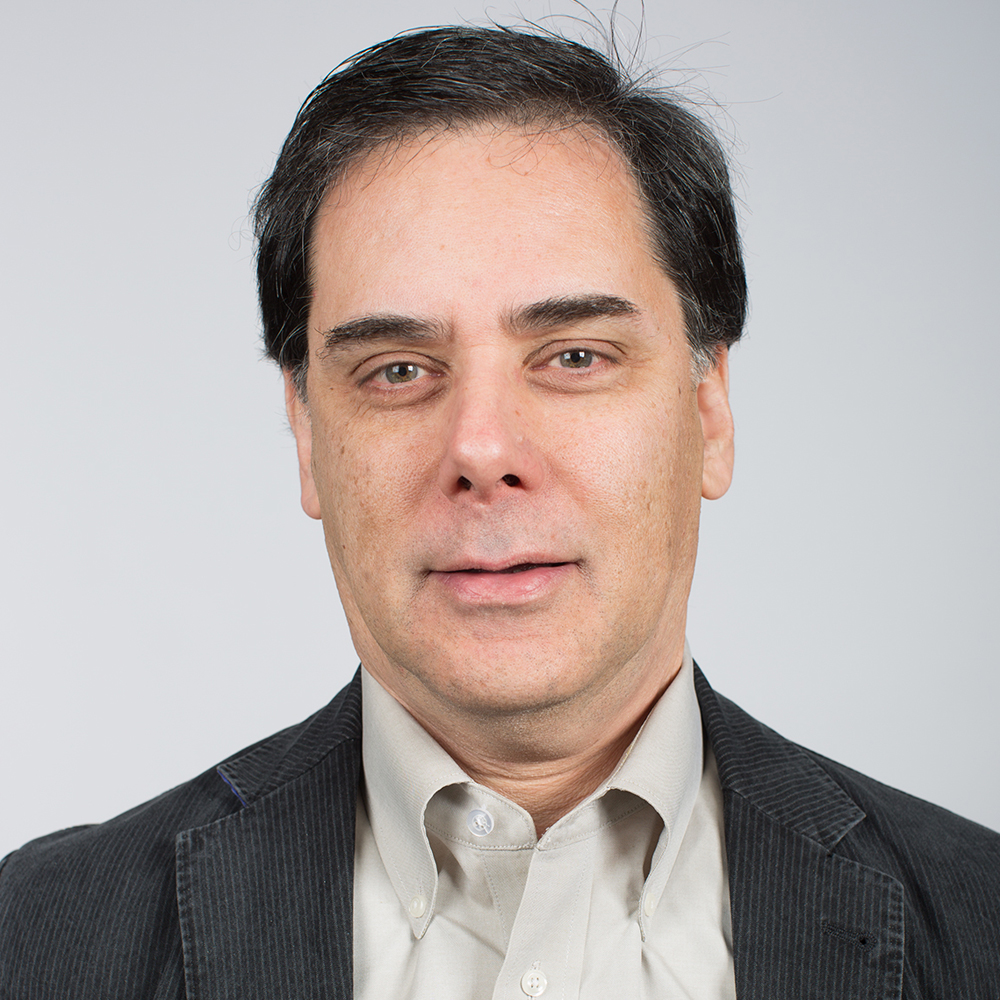Responding to changing community and political contexts in 2017, Convergence Partnership engaged in a series of internal and external discussions to re-examine how our grantmaking could better support racial and health equity. Six places (Buffalo, California, Chicago, Kansas, Kansas City Metro Region, and Louisiana) were prioritized for place-based investments based on an analysis of the following criteria:
Political, geographic, and demographic salience
Presence of other funder collaborative investments
Priority places for Partner institutions
Alignment with Convergence Partnership priority issues (at the time these included: resilient equitable development with a focus on transportation and housing; food systems; and prevention and health systems)
As a result, in 2018 the Partnership provided grants to seven organizations in six places that organize philanthropy and its constituencies to advocate for solutions that create equitable changes for diverse communities across the country. Grantees included six local and regional funders and one statewide grassroots network to support placed-based efforts that amplified investments in grassroots organizing; advanced local and regional policy and advocacy priorities; and shifted narratives to support racial equity:
Buffalo, NY — Community Foundation for Greater Buffalo
California — The Miyako Group
Chicago, IL — Elevated Chicago, and the Chicago Community Trust
Kansas —The Kansas Health Foundation
Greater Kansas City region — Health Forward Foundation
Louisiana — Foundation for Louisiana
San Joaquin Valley, CA — Sierra Health Foundation
In addition to funding these specific places, the Partnership brought on a set of national organizations to provide strategic support and technical assistance to the grantees, the Convergence Network, and the national Partnership on narrative change, food systems and policy, local economic development, and grassroots organizing and power building. This robust resource team informed and supported local, national, and Network-wide strategies and activities and accelerated Convergence-wide learning and progress by building synergy between efforts. The Resource Team consisted of Smart Growth America, Working Narratives, The Food and Agriculture Policy Collaborative* (FAPC), and the Center for Popular Democracy.
*A partnership of Fair Food Network, Food Research & Action Center, National Sustainable Agriculture Coalition, Policy Link, Reinvestment Fund, and The Food Trust
Read below for descriptions of the funded work followed by links to longer stories that capture the experiences and impacts of this work from the perspectives of the community members, grassroots and community organizations, and funder partners involved.
Fighting For Racial Equity And Community Power In A Changing Louisiana
From the Gulf Coast to the Northeastern reaches of the state, the Foundation for Louisiana’s TOGETHER initiative supports community power by training community residents most impacted by structural racism to advocate for policy solutions to address climate change, community development, and more.
With funding from the Convergence Partnership, the Foundation for Louisiana (FFL) expanded their TOGETHER Initiative, a leadership and advocacy training program for community residents. The TOGETHER Initiative was first launched in 2012 — supported by the Convergence Partnership’s Innovation Fund — and is a three-part leadership and training program for community residents to actively engage in and influence local policymaking to advance racial equity. First, a cohort of community residents in a specified area is recruited to participate in the Leadership, Engagement, Advocacy, and Development (LEAD) program. The LEAD program runs for 6-8 weeks and builds core skills in advocacy, the local policymaking process and context, and community engagement. Next, the most active LEAD participants partner with community-based organizations in a 3-4-week Equity Caucus to create a community-determined policy action plan. Third, FFL provides non-competitive implementation grants to support the community residents and organizations that have gone through the TOGETHER process in advocating for the strategies and policy solutions they identified during the Equity Caucus.
Convergence Partnership support in 2018-2019 allowed FFL to augment their existing TOGETHER investments along the Gulf Coast — resulting in 18 community resident-led urban storm-water projects to prevent coastal flooding — and also launched TOGETHER for the first time in the city of Monroe. Monroe is in Northeastern Louisiana, a region that typically receives minimal philanthropic investment. Efforts focused on the Southside of Monroe, a once economically thriving Black neighborhood that has experienced decades of disinvestment, residential segregation, and systemic racism leaving it home to 90% of the city’s blighted properties. Rather than adapting previous models of the LEAD training curriculum, FFL co-created the curriculum directly with community leaders. Emphasis was placed on designing the LEAD program to appeal to a younger generation of resident leaders who could carry on the organizing work of Southside’s community elders. Through FFL’s investments, 22 Southside residents received policy advocacy training on urban planning, community development, and racial justice through the LEAD program. Southside’s LEAD participants include a new generation of resident leaders who are joining longstanding community leaders in advocating for sustained economic investments to benefit racial justice. Click here to read more about the experiences and impacts of this work from the perspectives of the community members, grassroots and community organizations, and funder partners involved.
Dwayne Marsh
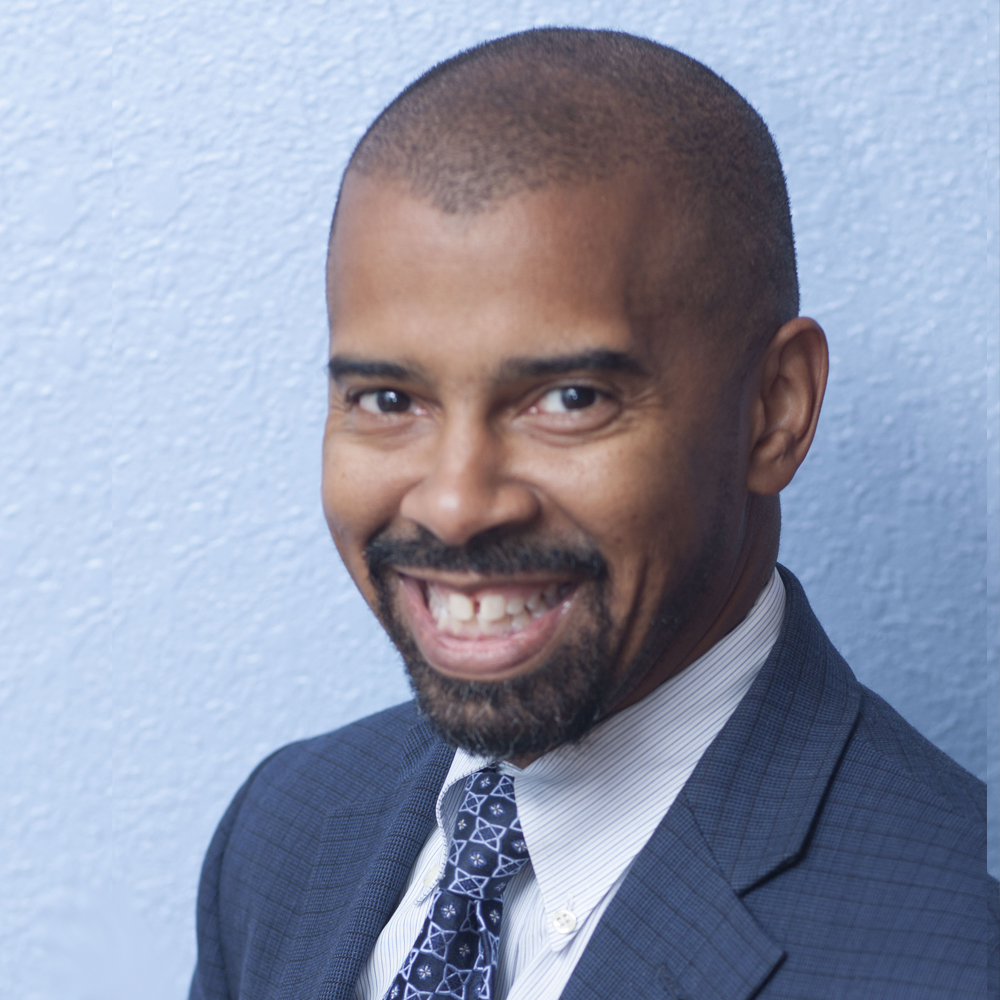
Dwayne S. Marsh, Co-Director of Government Alliance on Race and Equity (GARE) and Vice President of Institutional and Sectoral Change at Race Forward
Dwayne S. Marsh is co-director of Government Alliance on Race and Equity (GARE) and vice president of Institutional and Sectoral Change at Race Forward. The new Race Forward is the union of two leading racial justice nonprofit organizations: Race Forward and Center for Social Inclusion.
Prior to GARE, Marsh was a senior advisor at the U.S. Department of Housing and Urban Development. There, he advanced sustainable planning and development through interagency partnerships and departmental transformation. He coordinated a $250 million grant program and the capacity building resources that reinforced the work of pioneering grantees in 48 states and the District of Columbia. Under his leadership, his office prioritized equity as a foundational principle for its planning and investment initiatives.
Marsh brings to GARE his expertise and considerable experience in coalition building for regional equity and leadership development for policy change. Before HUD, Marsh spent a decade at PolicyLink, and prior to that, he directed the FAITHS Initiative for eight years at The San Francisco Foundation, building a nationally renowned community development and capacity building program that continues to this day.
Gretchen Beesing
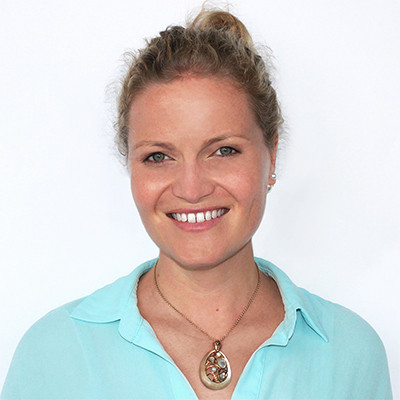
Gretchen Beesing, CEO, Catalyst Miami
Gretchen Beesing is the chief executive officer of Catalyst Miami. Beesing joined Catalyst in 2007, directing civic leadership and advocacy programs for more than five years, before becoming CEO in 2013. During her time at Catalyst, Beesing has integrated the organization’s services into an effective and empowering financial coaching platform that offers asset-building strategies at each stage of a client’s journey to prosperity. She effectively transitioned Catalyst from a financial literacy provider to a financial capability thought leader, engaging in many national partnerships and demonstration products, including Mission Asset Fund’s Lending Circles. Other accomplishments include conceiving and piloting the Miami Thrives executive leadership program for community development practitioners, the first of its kind in South Florida. Under Beesing's leadership, Catalyst hosted Miami’s first Poverty Solutions Summit, attended by more than 300 service providers, activists, and Miami-Dade County officials.
Beesing serves as chair of the Board of Directors for the South Florida Community Development Coalition. She participates in JPMorgan Chase’s Community Advisory Board (Florida), the Florida Policy Institute’s Community Advisory Board, Resilient 305 Steering Committee, and other advisory boards. Beesing was a 2015 American Express NGen Fellow and is an alumnus of the Federal Reserve Board’s Community Leaders Forum. She is a licensed clinical social worker with degrees from New York University and Kalamazoo College.
Jennifer Blatz
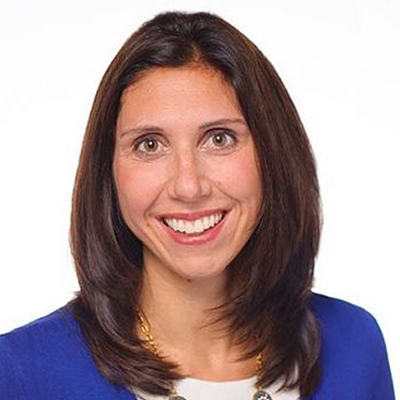
Jennifer Blatz, President & CEO, StriveTogether, Inc.
Jennifer Blatz is president and CEO of StriveTogether, where she oversees the organization’s operations and strategy for accelerating the progress of cradle-to-career partnerships to change systems and improve outcomes for kids. Prior to her work with StriveTogether, Blatz helped launch StrivePartnership, a cross-sector, cradle-to-career partnership serving Cincinnati and Northern Kentucky—one of the most notable collective impact initiatives in the country. As StrivePartnership’s director of operations, Blatz helped translate lessons from her work on the ground in Cincinnati, Northern Kentucky, and other communities across the country to launch the national Cradle to Career Network. Drawing on her passion for improving educational outcomes for underserved populations, Blatz has made her career in the social sector. This includes serving as executive director of the Ohio College Access Network and supporting the growth of the National College Access Network. She also was program officer for College & Career Access at KnowledgeWorks, where she managed a portfolio of initiatives focused on improving postsecondary attainment.
Blatz earned a bachelor’s degree, summa cum laude, in English from the University of Kentucky and a master’s degree in college student personnel from Miami University. She has been an active community volunteer through her participation in the Junior League of Cincinnati and as a mentor for a Cincinnati Public Schools student. Blatz has been named a YWCA of Greater Cincinnati Rising Star and one of Cincinnati Business Courier’s “Forty Under 40.” She is a graduate of United Way of Greater Cincinnati’s Volunteer Leadership Development Program, is a member of Cincinnati USA Regional Chamber’s WE Lead Class 10, and recently completed the Billions Institute Skid Row School for Large-Scale Change. Blatz lives in Northern Kentucky with her husband and three young children.
Kashif Shaikh
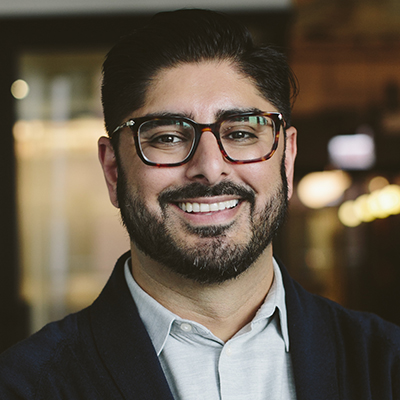
Kashif Shaikh, Co-Founder & Executive Director, Pillars Fund
Kashif Shaikh is the co-founder and executive director of the Pillars Fund, an organization that invests in and amplifies the talents, narratives, and leadership of American Muslims. Under Shaikh's leadership, Pillars has grown from a volunteer-led community fund to a fully staffed, nationally recognized foundation that has invested over $3.5 million into nonprofits working with and alongside the American Muslim community. With over 13 years of experience in the philanthropic sector, Shaikh is a leading voice in the field of philanthropy and the important role it plays in empowering vulnerable communities. Prior to launching Pillars, Shaikh was a program officer at the Robert R. McCormick Foundation, where he managed a portfolio of over $5 million and helped scale some of the most promising nonprofit organizations in Chicago, working at the intersection of racial justice, poverty, and education. Additionally, he managed the Foundation’s corporate partnerships and helped develop corporate social responsibility strategies for the Chicago Tribune, Chicago Blackhawks, and the Chicago Bulls. Shaikh's career began at the United Way of Metropolitan Chicago, where he advanced key strategies to engage the organization’s largest corporate partners.
Shaikh currently serves on the Board of Directors of 826 National, an organization founded by acclaimed author Dave Eggers that is dedicated to supporting students ages six to 18 with their creative and expository writing skills. He is also on the Board of Trustees for the Chicago Theological Seminary. He was recently named to the Board of Directors for the Peabody Awards. In 2017, he was selected to Crain Chicago Business “40 Under 40” list. Originally from Cincinnati, Ohio, Shaikh holds a bachelor’s degree from Ohio State University and a master’s in public policy and administration from Northwestern University.
Liz Dozier

Liz Dozier is the chief executive officer of Chicago Beyond, a social impact investor she launched in 2016 that backs the fight for youth equity by fueling ideas, organizations, people, and ventures to help all youth to achieve their fullest human potential. Since its inception, Chicago Beyond has invested more than $30 million in 12 local nonprofit organizations that work to create equitable access and opportunity for Chicago’s young people. This is accomplished by Chicago Beyond’s partners through various holistic approaches: from a program that strengthens young African American fathers to a post-release employment program leveraging the performing arts. Beyond providing transformative funding, Chicago Beyond works hand-in-hand with its partners to ultimately grow their impact. From strategic planning to development to branding and communications supports, Chicago Beyond designs unique investment plans to help its partners reach their goals.
Dozier’s ambition is born from her experiences as an educator in Chicago Public Schools. During her tenure as principal at Fenger High School — at the time known as one of the most violent and underperforming schools in Chicago — Fenger experienced a decrease in its dropout rate from 19 percent to 2 percent, a 40 percent increase in Freshman On-Track to graduate, and double-digit increases in attendance and the state graduation rate. Keenly aware of how traumatic events outside of the classroom were affecting her students, Dozier’s method to turn Fenger around also included the adoption of restorative justice and mental health and wellness strategies. Dozier's work has been featured in various outlets such as The New York Times, How Children Succeed, by Paul Tough, CNN’s docu-series Chicagoland, and forums such as Aspen Ideas Festival, the Kennedy Center Forum on Mental Health, and SXSW.
Lyla June Johnston
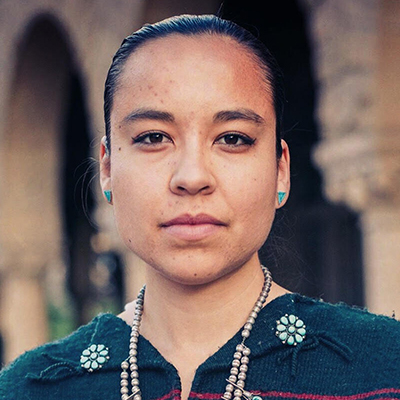
Lyla June, Doctoral Student, Artist, and Community Organizer
Lyla June is a poet, musician, human ecologist, public speaker, and community organizer of Diné (Navajo), Tsétsêhéstâhese (Cheyenne), and European lineages. She is a co-founder of The Taos Peace and Reconciliation Council, which works to heal intergenerational trauma and ethnic division in northern New Mexico. She was a walker within the Nihigaal Bee Iiná Movement, a 1,400-mile prayer journey through Diné homelands for environmental and social justice. She is the lead organizer of the Black Hill Unity Concert and the founder of Regeneration Festival, an annual celebration of children that occurs in 13 countries around the world every September. June's dynamic, multigenre performance style has invigorated and inspired audiences across the globe toward personal, collective, and ecological healing. Her messages focus on Indigenous rights, supporting youth, intercultural healing, historical trauma, and traditional land stewardship practices. Her undergraduate studies in human ecology, coupled with a traditional upbringing, inform her potent messages conveyed through the medium of powerful, yet prayerful hip-hop, poetry, acoustic song and speech. Her personal goal is to grow closer to the Creator by learning how to love deeper.
June graduated with honors from Stanford University in 2012 with a degree in environmental anthropology. She recently graduated from the University of New Mexico, with distinction, with a concentration in American Indian education.
Malcolm Torrejón Chu
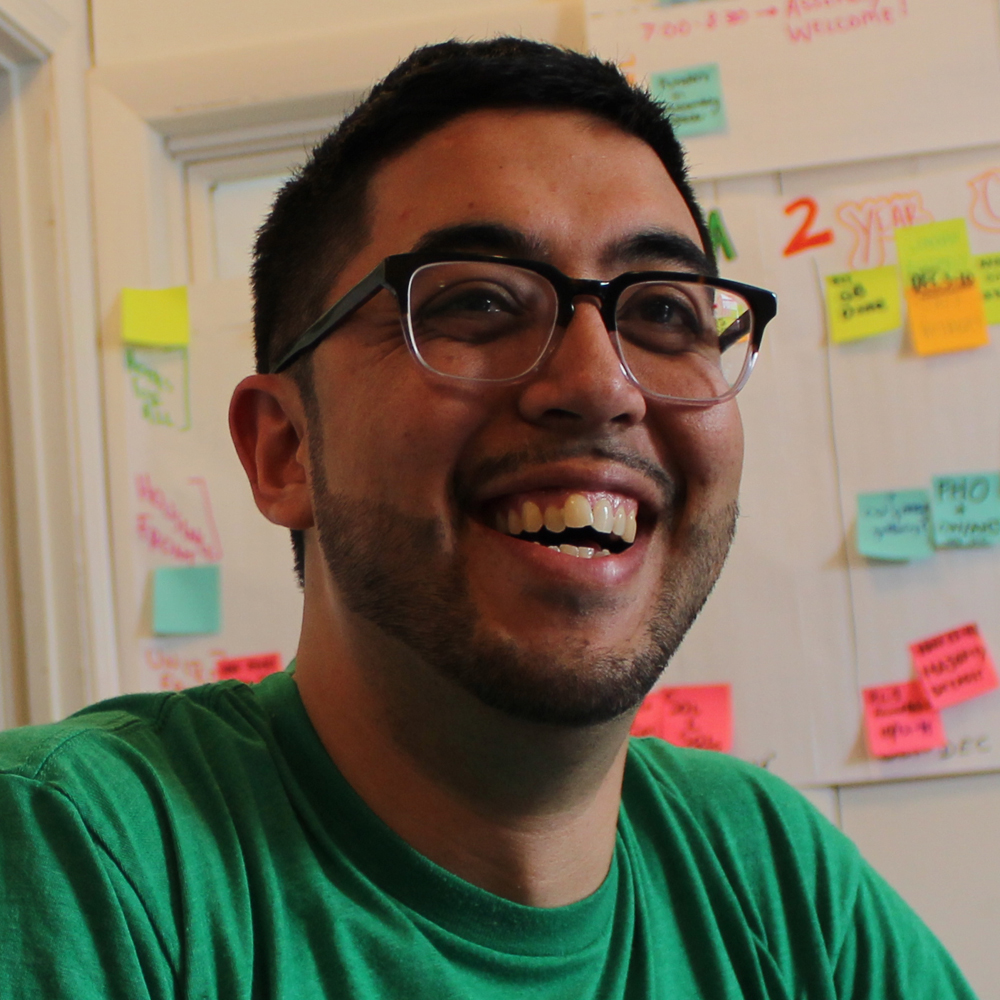
Malcolm Torrejón Chu, Communications Strategist, Right to the City
Malcolm Torrejón Chu is a communications strategist at Right to the City (RTC), a national alliance of racial, economic, and environmental justice organizations fighting gentrification and displacement of low-income people, people of color, marginalized LGBTQ communities, and youths of color from their historic urban neighborhoods. Chu was born and bred in Brooklyn, New York, but now finds himself in Boston. Chu’s early exposure to gentrification in Brooklyn, and to the fight for community control of community space and housing as a human right came while volunteering with the Fifth Avenue Committee as a teenager on their Eviction Free Zone campaign. Later, Malcolm got schooled as an organizer with Springfield No One Leaves/Nadie Se Mude in Springfield, Massachusetts, where he spent seven years as the lead organizer building a grassroots, people of color, and resident-led movement against displacement and foreclosure. Chu was a member of the Homes For All organizing committee for three years before joining the Right to the City staff in 2016.
Marco A. Davis
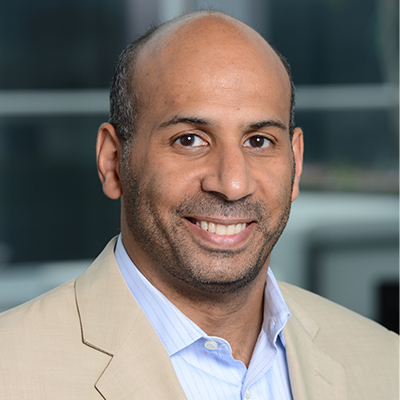
Marco A. Davis, Partner, New Profit
Marco Davis is a partner at New Profit, a national nonprofit venture philanthropy that provides unrestricted growth capital and strategic expertise to a diverse portfolio of breakthrough social entrepreneurs, investing in new ideas and strengthening the ecosystem around social entrepreneurs. At New Profit, he leads Capitalizing Diverse Leaders and Organizations, a comprehensive strategy to create a more equitable social sector through: increasing capacity-building funding and support for diverse leaders; developing philanthropic leaders of color; transforming social sector organizations by building diversity, equity, and inclusion (DEI) capacity; and expanding DEI data collection and analysis. Before joining New Profit, Davis served under President Barack Obama as deputy director and acting executive director of the White House Initiative on Educational Excellence for Hispanics, which included leading engagement with the Hispanic community on the My Brother’s Keeper Initiative. He also served as director of Public Engagement at the Corporation for National and Community Service. Previously, he was director of Global Fellowship and regional manager for Latin America at Ashoka’s Youth Venture. Earlier in his career, he was director of Leadership Development at UnidosUS (formerly the National Council of La Raza), where he created the Líderes Initiative.
Davis is a frequent speaker on topics including the U.S. Latino community, diverse leadership in the nonprofit sector, and education in the United States, and has been featured at events, including the Aspen Ideas Festival and Skoll World Forum on Social Entrepreneurship. In 2017, he was named a Pahara-Aspen Education Fellow. Davis serves on the boards of Education Leaders of Color, and the Education Design Lab. He received a bachelor's in history and Latin American studies from Yale University, and is a member of Alpha Phi Alpha Fraternity, Inc. Originally from the New York City area, he lives in Washington, DC with his wife and daughter.
Michael Thomas, Jr.
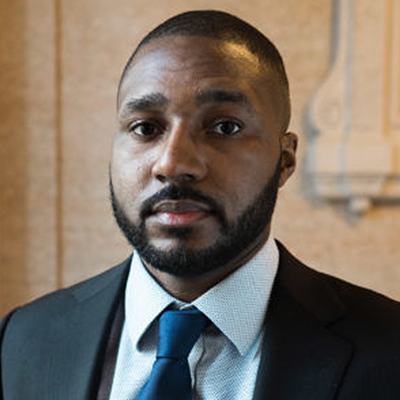
Michael Thomas, Jr., President, Harvard Law Review (Vol. 132)
Michael Thomas currently serves as the 132nd president of the Harvard Law Review. After his undergraduate studies, Thomas worked as the founder of PH2OG, a sustainable water venture, and then in the Mayor’s Office of New York City in the office of the Counsel to the Mayor, where he developed strategic initiatives for the city’s small businesses. Following law school, Thomas will return to New York City as a judicial clerk for the Honorable Colleen McMahon, Chief Judge of the Southern District of New York, and for the Honorable Barrington Parker, Jr., Senior Judge on the 2nd Circuit Court of Appeals.
Raised in Brooklyn, New York, Thomas attended the Dalton School and matriculated to Princeton University, where he graduated magna cum laude in 2012. He is an alumnus of the New York City-based Prep for Prep program, and currently in his final year at Harvard Law School.
Ana Garcia-Ashley
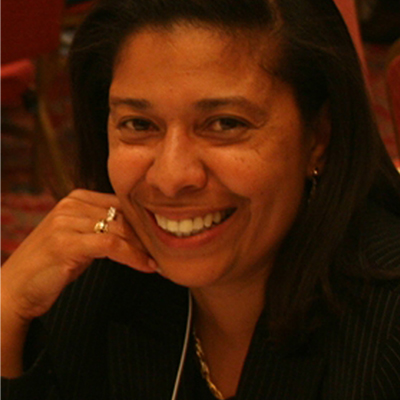
Ana Garcia-Ashley, Executive Director, Gamaliel
Ana Garcia-Ashley is the executive director of Gamaliel, an organization founded to train community and faith leaders to build political power and create organizations that unite people of diverse faiths and races. She began her career in 1981 organizing the Concerned Citizens of Westwood, and went on to be part of developing the Metropolitan Organization for People. After graduating from the University of Colorado in Denver, Garcia-Ashely attended the Iliff School of Theology and began what would become her life's work at Gamaliel. As Garcia-Ashley was born in the Dominican Republic, her experiences, both professional and personal, brought a much-needed passion and awareness to her position. Initially serving as the senior staff organizer with the Gamaliel Foundation for 10 years, she then became lead organizer of MICAH—the Milwaukee Inner City Congregations Allied for Hope. While in this position, her leadership led to a $500 million reinvestment victory, which allowed 7,000 low-income families in Milwaukee to buy homes. She later went on to staff the development of the regional organization of WISDOM in Wisconsin, and became a national and international congregation-based leadership trainer. This care and concern for social justice continues today as executive director of the Gamaliel Foundation and director of the Southern Territory.
Mindy Fullilove
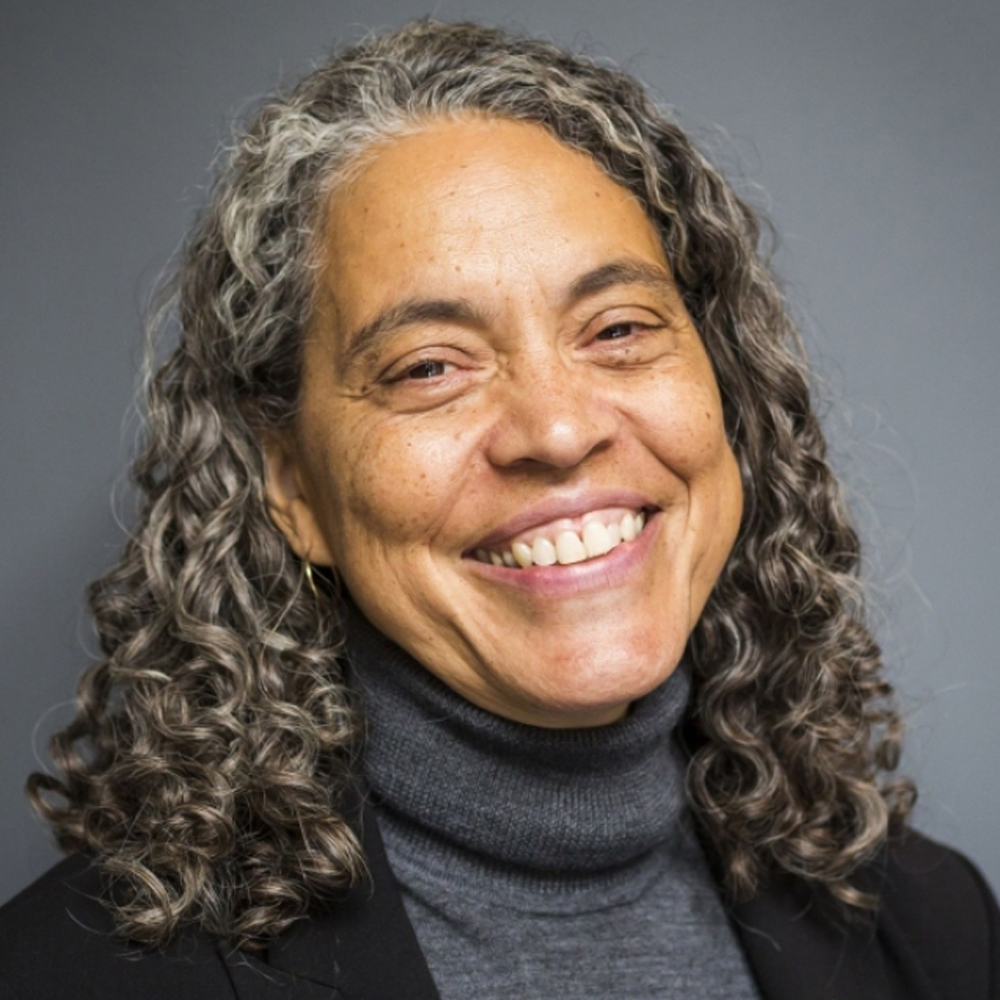
Dr. Mindy Thompson Fullilove is a professor of urban policy and health at The New School, having moved there in 2016 after 26 years at New York State Psychiatric Institute and Columbia University. In 2007, along with other community activists, she helped found the University of Orange in her hometown of Orange, New Jersey. The university is a collective offering free courses in urban culture so that students can become more active in determining the future of their city.
Fullilove graduated cum laude from Bryn Mawr College with a bachelor's in history. She received a master's in nutrition and her medical doctorate from Columbia University. Her research examines the mental health effects of environmental processes such as violence, segregation, and urban renewal. In 2016, Fullilove was named an honorary member of the American Institute of Architects for "advancing architecture and urban planning through her expansive knowledge of cities and the relationship between the built environment and the wellness of society."
Otho E Kerr III
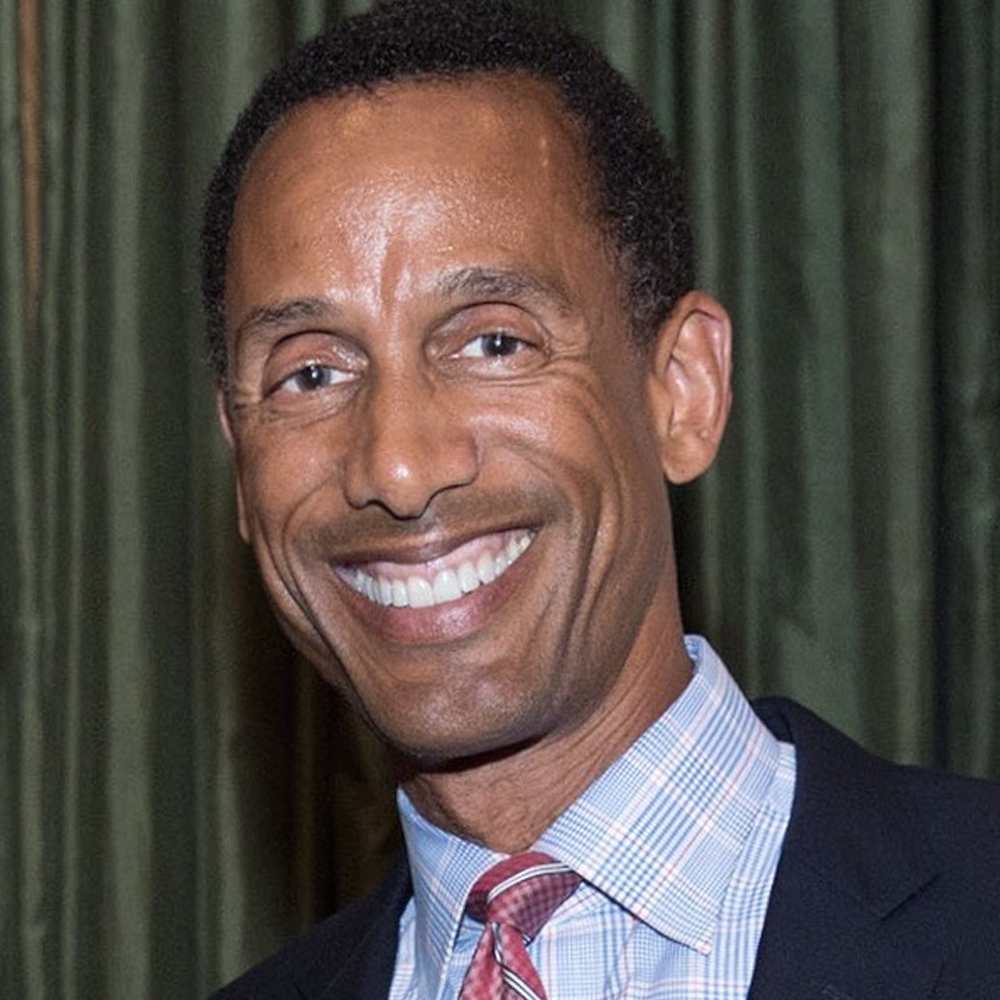
Otho Kerr is a partner at Encourage Capital, an investment firm that seeks to change the way investment capital is used to solve critical environmental and social problems. Prior to joining Encourage (formerly EKO Asset Management Partners), Kerr was an executive director at Oppenheimer Asset Management. He has worked in the investment banking and asset management industries for over 20 years, having begun with Goldman Sachs & Co., where he worked in the Investment Banking Division. While at Goldman, Kerr managed the U.S.'s first Rule 144A transaction. He later became Director and Head of the Corporate Finance Retail Industry Group at Deutsche Morgan Grenfell (Deutsche Bank) where his clients included The Home Depot, Toys-R-Us, Kmart, and Spiegel. Kerr has a wealth of experience managing private placements and public offerings of debt and equity. He began his professional career as an attorney with the law firm Simpson Thacher & Bartlett.
Kerr received his bachelor's degree from Dartmouth College and a JD from Harvard Law School. Throughout his career, he has sought to merge his professional career with his interest in social justice. He was a co-founder of the Institute for Youth Entrepreneurship in Harlem. He was a fellow in the Rockefeller Foundation's Next Generation Leadership Program. He was the Chairman of the Board of Trustees for PAX, Inc., serves on the Board of Directors of the Empire State Pride Agenda and the board of Freedom to Marry. He was the first member of his class to receive the Dartmouth Alumni Award in 2007.
Shireen Malekafzali
Shireen Malekafzali, Senior Manager, Health Policy, Planning and Equity, San Mateo County
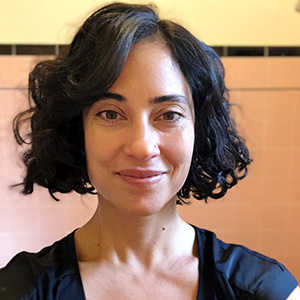
Victor Rubin
Dr. Victor Rubin
